This page with the address emhis.blogg.lu.se is no longer updated. We have a new homepage with the address emhis.org – please come and visit us there! Cheers!
Welcome to EMHIS!
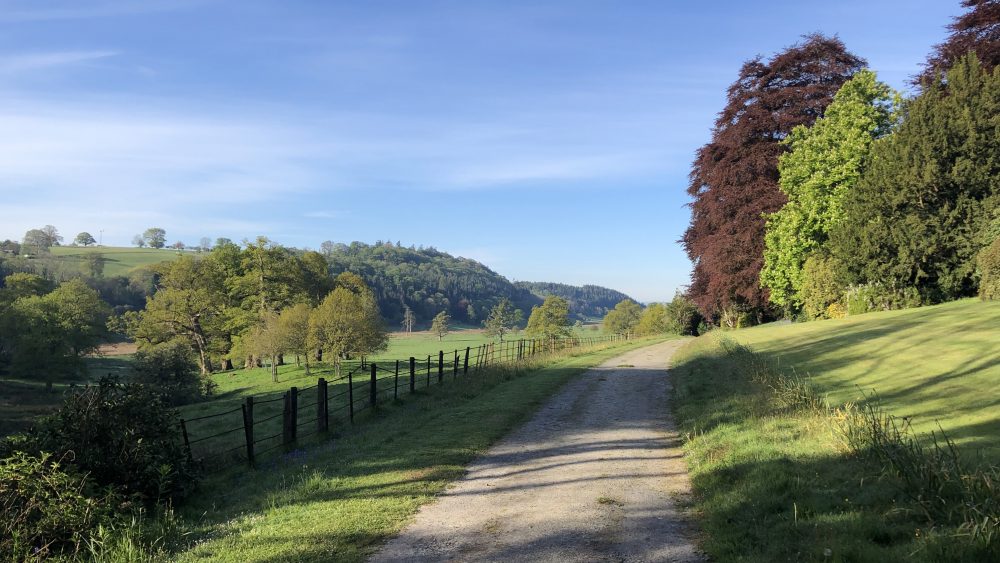
A research network for European media historians since 2013

This page with the address emhis.blogg.lu.se is no longer updated. We have a new homepage with the address emhis.org – please come and visit us there! Cheers!
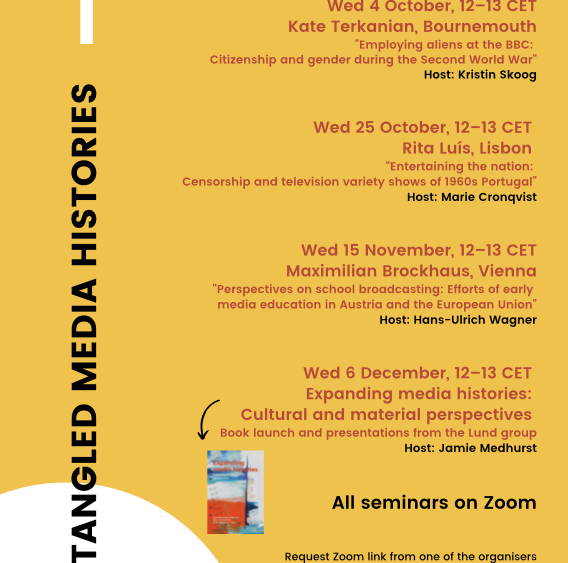
Welcome to join us for the EMHIS Lunch Webinar Series, autumn 2023, with new exciting presentations. As usual, our seminars are one hour with a 30-minute presentation followed by a discussion. If you are interested to join in, please send a mail to one of the organisers: Marie Cronqvist or Kristin Skoog (addresses on the poster below). Please note also that all times are Central European time.
Hope to see you there!
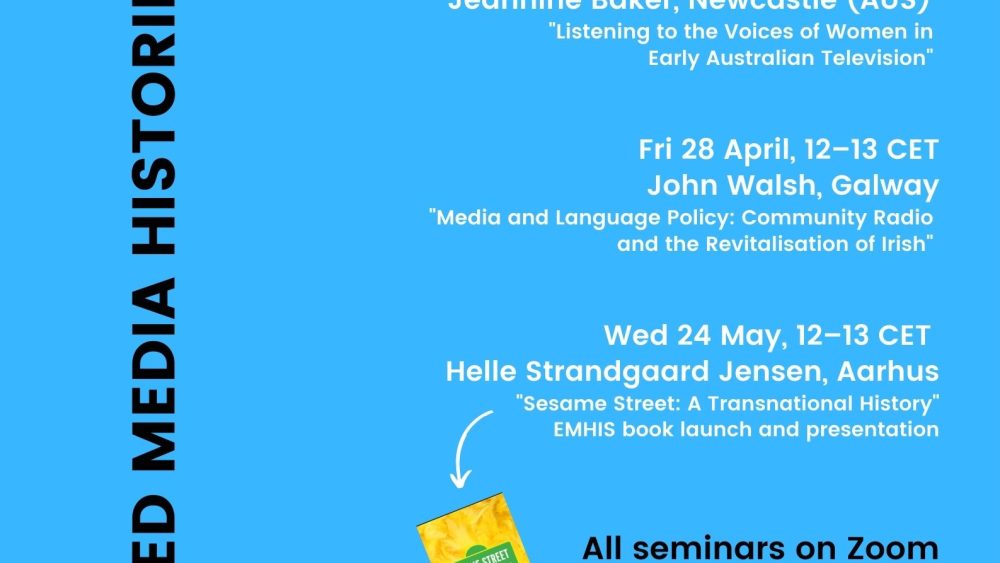
Welcome to join us for the EMHIS Lunch Webinar Series, spring 2023, where we will move from media furniture in the IKEA home ecology via Australian women television workers and Irish language policy in radio to the global culture and politics of Sesame Street. As usual, our seminars will be one hour with a 30-minute presentation followed by a discussion. Please note that the times and weekdays may differ from our regular time slots. If you are interested to join in, please send a mail to one of the organisers: Marie Cronqvist or Kristin Skoog (addresses on the poster below). Note also that all times are Central European time.
Hope to see you there!
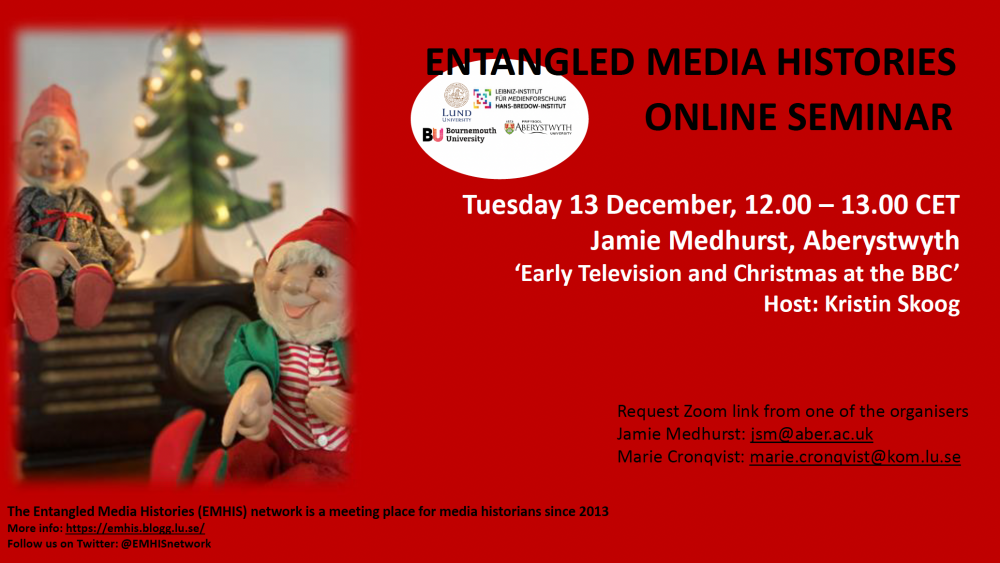
Ho, ho, ho! Next week, we have a change in the seminar schedule for our lunch online seminars. John Walsh, whom we were going to listen to on Wednesday, needs to postpone his talk for next year. Instead, Jamie Medhurst has jumped in and agreed to deliver a holiday special on the theme of “Early Television and Christmas at the BBC”. Welcome everyone – email Jamie or Marie for link (see poster)!
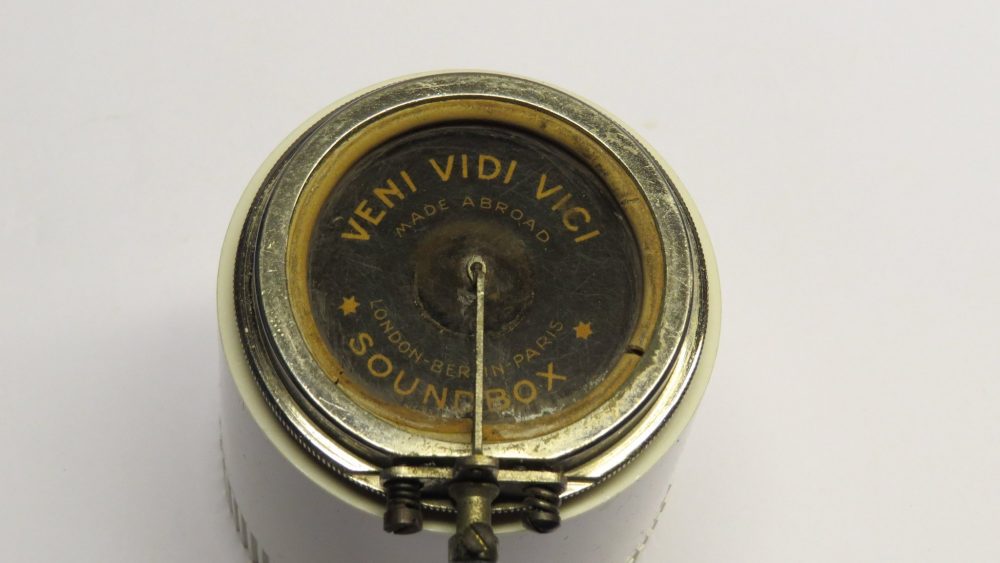
Last week, on the 24–25 of November, the EMHIS network gathered for yet another meeting, the EMHIS Forum X. Once again, the forum was held on Zoom, but as we cautiously enter what we hope is a post-pandemic era, our plans are of course to return to arranging our upcoming meetings in real life. Nevertheless, the atmosphere was as warm as ever when old and new friends and colleagues came together!
The theme of the first day of EMHIS X, this time arranged by Kristin Skoog (Bournemouth) and Jamie Medhurst (Aberystwyth), was “Entangled histories of public service broadcasting”. Sparked by the recent BBC centenary and other jubilees (Channel 4 and S4C Channel Four Wales) that have placed the issue of public service broadcasting at the centre of public as well as academic discussion, our question for this forum was: What entangled media histories perspectives can be added to broaden the discussion of public service broadcasting? What transnational and transmedial links can be uncovered?
After a couple of initial opening remarks by Kristin and Jamie, two panels with research presentations. The first panel centered on reinventions/redefinitions of television in the 1970s. Allan Burnett (Lund) recapitulated the main structure of his doctoral thesis on the much celebrated television documentary series The World at War, made by ITV in the early 1970s, and to what extent it challenged its British and international audiences. Jamie Medhurst (Aberystwyth) then held a presentation focused on the so-called Annan Committee and its vision of the future of broadcasting in the mid-1970s. Rounding up the first panel, Mari Pajala (Turku) told us about the debates about the Nordvision television co-operation in the five Nordic countries around 1970.
The second panel “Connecting histories” consisted of two presentations. Kristin Skoog (Bournemouth) presented her work on the women’s movement and public service programming, and Hugh Chignell (Bournemouth), provoked some thoughts about how views on literary modernism could benefit from an entangled media history perspective.
Concluding our first day, we were delighted to listen to a talk by our special EMHIS guest professor David Hendy. Departing from his recent work on the history of the BBC and in particular the book BBC – a People’s History (Profile Books, 2002), David laid out some fascinating perspectives on the international and transnational connections and links that shaped the experiences of the BBC pioneers in the 1920s.
Following the basic structure of our previous EMHIS IX, arranged by the Lund team, the second day was open to network members only and focused on ongoing research and news, including updates, presentations of work-in-progress, and introduction of new members. Marie Cronqvist (Lund) started off by recapitulating the soon 10-year history of EMHIS network and informed everyone about the steering committee’s plans for the future including upcoming applications and activities. After this, we had two panels of interesting presentations by new members of the network. As a start, Yulia Yurtaeva-Martens (Hamburg/Potsdam) and Clare Church (Aberystwyth) briefly reintroduced themselves, followed by Maximilian Brockhaus (Vienna), who presented the framework of his thesis on school television in Austria, and Oscar Winberg (Turku), who talked about his research on television, gender and politics in the 1994 presidential election in Finland. In the second panel, Sian Nicholas (Aberystwyth) presented some intermedia aspects on the Second World War in Britain, and Emil Eiby Seidenfaden (Copenhagen) presented his research on Scandinavian Foreign Affairs journalists in the late 1940s.
The afternoon of the second day was dedicated to updates from other EMHIS members. Ina Ėmužienė (Vilnius) talked about interwar Lithuanian-American radio broadcasting and how this will feed into her brand new project on Soviet Lithuania and the postwar period. In his intervention, Hans-Ulrich Wagner (Hamburg) continued the already existing discussion within EMHIS about the digitization of radio and television programme magazines, departing from the ongoing digitization of the Hamburg-based German magazine Hör Zu! in a collaboration with the Hamburg State Library. After a short break, the Hamburg team consisting of Hans-Ulrich with colleagues Yulia Yurtaeva-Martens and Immo Erik Hagemann presented their joint project on the history of the Deutsche Presse-Agentur (DPA), and the Lund team consisting of Marie Cronqvist, Christine Davidsson Sandal and Eskil Vesterlund presented, first, their outreach work with the Vattenhallen Science Center on establishing a Media History Lab, and second, their work on the joint edited volume with the title Expanding Media Histories: Cultural and Material Perspectives (eds. Bechmann Pedersen, Cronqvist, & Holgersson) which will come out 2023 with Nordic Academic Press.
Rounding up the two-day event with a general discussion, we all agreed on the value of continuing our network, the necessity of new perspectives and fresh input by new members, and our ambition to once again meet irl at some nice location, hopefully for a 10 anniversary of the EMHIS network in 2023!
Report written by Marie Cronqvist
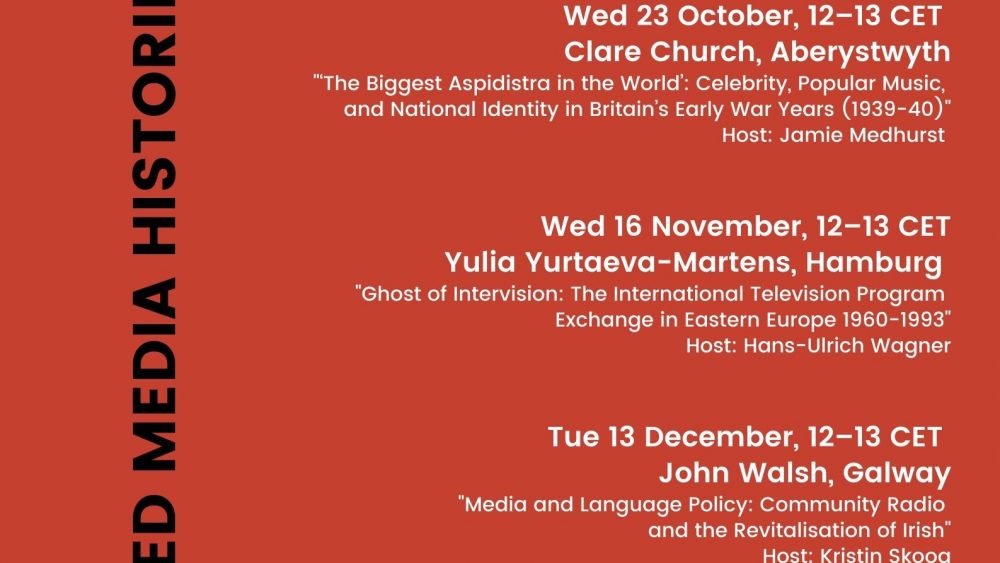
Welcome to join us for the EMHIS Lunch Webinar Series, autumn 2022. As usual, our seminars will be one hour with a 30-minute presentation followed by a discussion. If you are interested to join in, please send a mail to one of the organisers: Marie Cronqvist or Jamie Medhurst (addresses on the poster below). Please note that all times are Central European time.
Welcome!

At the end of April, I had the pleasure to visit the Section for Media History at Lund University for a week that turned into a veritable (unofficial) EMHIS festival or jamboree. Several EMHIS members were gathered in Lund to discuss audiovisual archives, transnational media history and digital methods.
Alec Badenoch (Utrecht University/ Vrije Universiteit Amsterdam) spent two weeks in Lund with funding from the Sound Environment Centre. He gave talks about two exciting projects he leads as the Professor of Transnational Media endowed by the Netherlands Institute for Sound and Vision. The first talk, “Experimental Media Archaeology and Audiovisual Production” asked how to archive analogue audiovisual media in a way that would enable access to the embodied experience of analogue media production. In particular, this project works with artists to find out how archives could better serve their needs. Experimental media archaeology serves here as a method to investigate ways of accessing the experience of analogue media production.
Alec’s second talk, “Sound, Images and Postcolonial Archives: Polyvocal Interpretations” addressed the important theme of decolonizing audiovisual archives. The aim of this research project is to design a postcolonial archival interface that enables the critical examination of Dutch colonial history. The talk raised questions such as how to deal with racist terms in old metadata and how to frame archive material from the colonial era in a way that creates productive alienation for the user. Both projects showcase The Netherlands Institute for Sound and Vision’s commitment to making audiovisual archives accessible, developing research collaboration with universities and critically examining archiving practices.
Also visiting Lund was Helle Strandgaard Jensen (Aarhus University). Together with Betto van Waarden, Helle gave a seminar on digital history located at the Department of History, which I was sorry to miss due to arriving in Lund too late. Another seminar focused on the history of children’s television: I got to discuss my on-going research on Finnish 1970s and 1980s preschool television programmes while Helle presented her book Selling Sesame Street, which will be published by Oxford University Press later this year. In her book, Helle challenges the “official history” of Sesame Street which claims that the show’s international success was due simply to its quality and broad appeal. Using a global history approach, she shows that the producers of Sesame Street in fact marketed the programme aggressively in Europe and Latin America. Despite its non-commercial branding in the US, Sesame Street became a commercial predator in the international television marketplace.
After two years of online events, it was a real treat to spend a beautiful spring week in Lund, with days filled with lively discussion, shared meals and afternoon fika. The week really made me realize what we have missed out on during the pandemic. The Media History section in Lund made a great impression with its warm and collegial atmosphere. Many, many thanks to Marie Cronqvist and all the colleagues at Media History for an inspiring week!
Mari Pajala
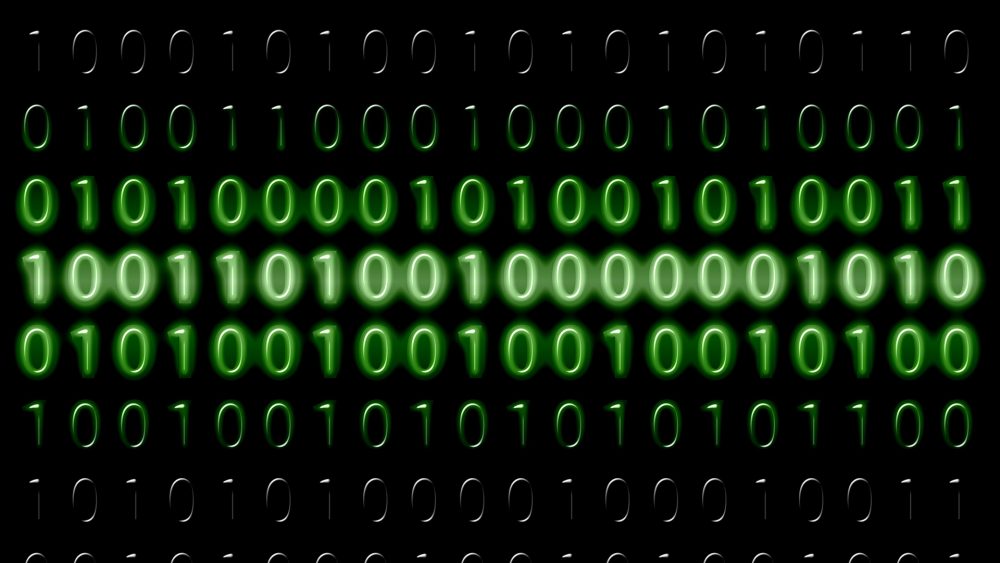
The theme of this year’s ECREA Communication History Section Workshop was “History of Digital Media and Digital Media Historiography” and it was held at The Centre for Digital and Contemporary History C2DH at the University of Luxembourg. The workshop was co-sponsored by the ICA Communication History Division and organized by Valérie Schafer and Carmen Noguera (C2DH) with assistance from the head of the COHECREA section Gabriele Balbi (USI).
True to the times we live in at the – fingers crossed – final phase of the Covid pandemic, the workshop was held in hybrid form with most participants taking part of the conference online and only a few on-site. But as we have come to learn by now, an online event can still be successful if it is marked by two things: a good spirit and engagement from all participants (cameras on!), and a warm and welcoming atmosphere on behalf of the organizers. This conference indeed had both.
We had the privilege of each charing a session and taking part in the discussion following a number of interesting presentations over the the two and a half days on topics such as digital historiographies, analogue content in the digital realm, women, history and heritage, and digitalization. The full programme can be found on this page.
Several EMHIS members gave talks at the conference. Helle Strandgaard Jensen with Danish colleagues Alexander Thygesen, Josephine Møller Jensen and Max Odsbjerg Pedersen presented on “How Do Twitter Users Remember Sesame Street? A scalable reading of media history”. The speakers demonstrated the importance of looking beyond hashtags and provided a model for bridging distant and close readings of Twitter data. Stephanie Seul from the University of Bremen also attended the conference. In Stephanie’s presentation, “Tracing Female War Reporters of the First World War in Digital Newspaper Archives: A transnational approach”, she shared with us the trials and tribulations of doing transnational media history in digital newspaper archives.
Two interesting keynotes were offered. One by Claude Mussou from the Institut National de L’audiovisuel (INA), who talked about the opportunities and challenges the digitized and “augmented” audiovisual archive faces, and one by Niels Brügger from Aarhus University, who talked on the topic “Media Events: Dayan & Katz Revisited in the Light of Digital Media”, using the Olympic Games as a case study. A valuable and much appreciated addition to the conference programme was also the hands-on sessions on Impresso and digitised newspaper archives by Marten During and Lars Wieneke, and on Zotero and Tropy by Sean Takats.
Although we sadly missed the opportunity to visit Luxembourg in person this time, we thoroughly enjoyed the conference and look forward to the forthcoming events arranged by the ECREA and ICA Communication History Sections.
Sune Bechmann Pedersen & Marie Cronqvist
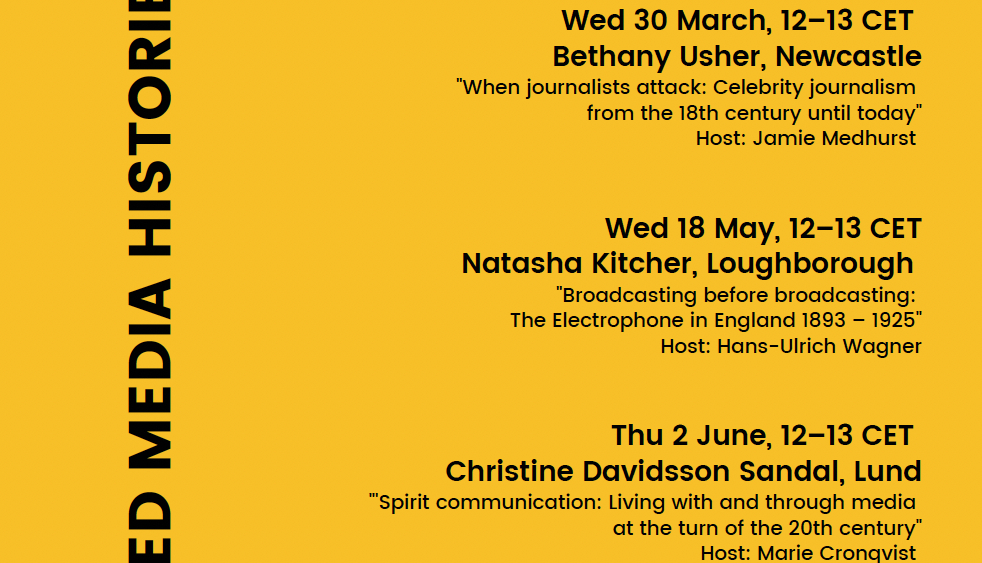
Welcome to join us for the EMHIS Lunch Webinar Series, spring 2022. As usual, our seminars will be one hour with a 30-minute presentation followed by a discussion. If you are interested to join in, please send a mail to one of the organisers: Marie Cronqvist or Jamie Medhurst (addresses on the poster below). Please note that all times are Central European time.
Welcome!
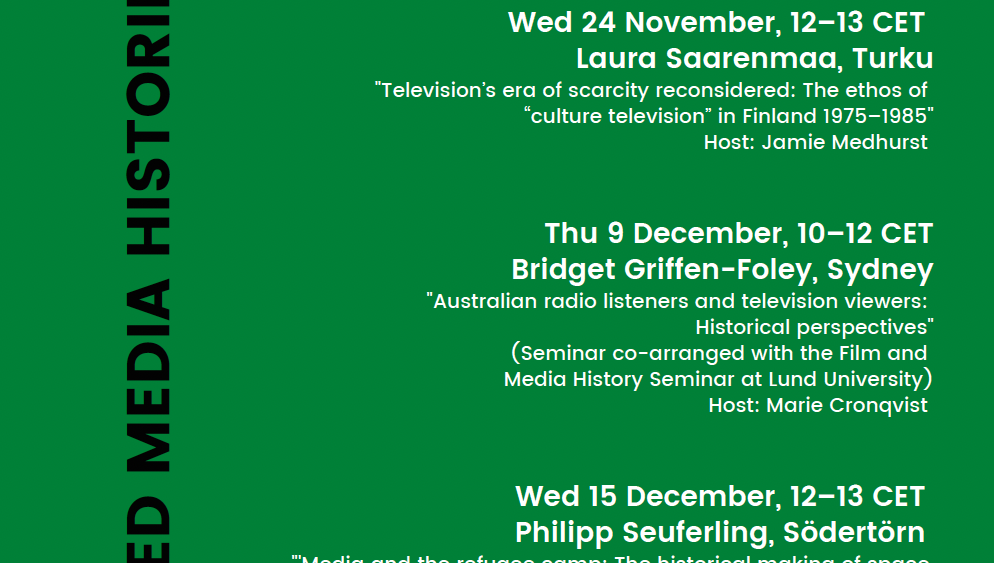
A warm welcome to join the autumn EMHIS Lunch Webinar Series, which will run from October until December 2021. As in the spring, our seminars will be one hour with a 30-minute presentation followed by a discussion. An exception is the co-arranged seminar on 9 December. If you are interested to join in, please send a mail to one of the organisers: Marie Cronqvist or Jamie Medhurst (addresses below). Please note that all times are Central European time.
Welcome!
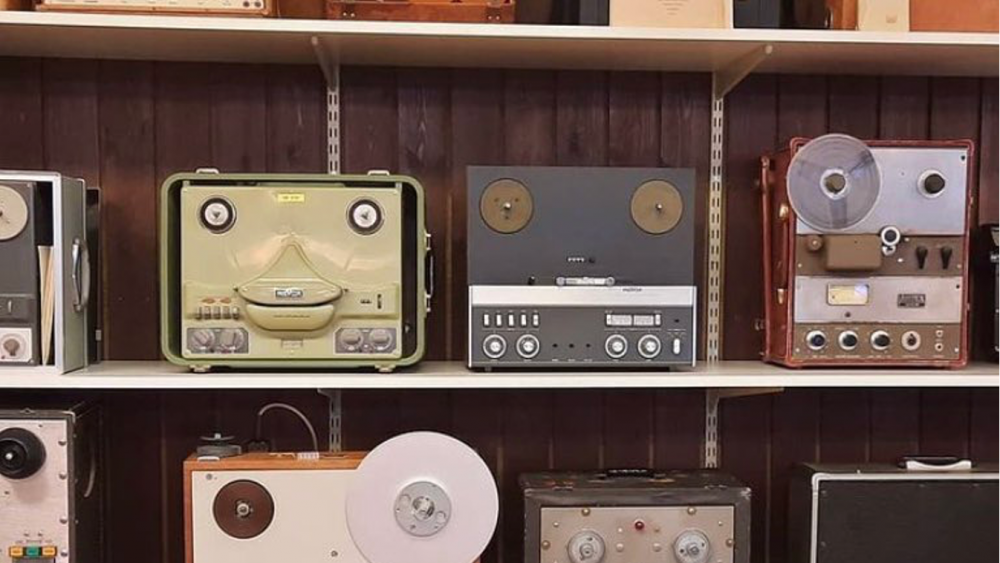
It was a warm and welcoming atmosphere as we joined EMHIS IX online from various places (home and work offices), different time zones, and countries in Europe (and beyond). The Covid-19 pandemic might have put a spanner in the works on international travel but with the wonder of Zoom and the Wonder meeting platforms we were able to get together again as a group. EMHIS IX was organised in collaboration with DigitalHistory@Lund, a research platform run by the Section for Media History and the Centre for the History of Knowledge (LUCK) at Lund University (Sweden), which also set the theme for the conference: ‘Digital Sources, Digital Methods’.
The day began with news and updates from the EMHIS steering committee, and we were also reminded of our last (in person) gathering in the enchantingly setting of green hills and grounds, of Gregynog Hall, in May 2019. Little did we know then how much our work, research, and every day (social) experience, would change moving forward to May 2021.
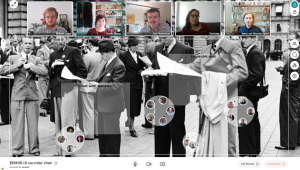
After a brief news update from the steering committee our first session began. This session included short introductory presentations from new EMHIS members. First out was Hermann Breitenborn (Hamburg University, Germany) who talked about the city of Hamburg and its districts, and how the city was in focus in the so called ‘St. Pauli films’ or ‘Hamburg films’ of the 1960s and 1970s. What shots and locations were used to create the image of the city? A transnational theme was also introduced as many of the film rights were sold internationally. Our second speaker Mari Pajala (University of Turku, Finland) talked about her research on Finnish television, for example, Cold War era contacts between Finnish television and state-socialist television, before introducing her current research on Nordvision – a network of Nordic public service broadcasters established in 1959 to encourage programme exchange, co-operation, and a sense of a Nordic community. From Nordvision to Swedish television, our third speaker Emil Stjernholm (Lund University, Sweden) talked about his new research project that looks at television as a medium for government information and the role of the Swedish Television in particular as a communication tool for government. A key component of the research will be the analysis of Anslagstavlan (a bulletin programme introduced in 1972) and Emil shared some thoughts and insights of how the collection will be analysed using digital methods – a topic we returned to in our afternoon session. Eskil Vesterlund (Lund University, Sweden) presented an overview of his ongoing PhD research that aim to historicise opinion polls by studying the Swedish Gallup Institute, and the Gallup poll as a media technology in the 1940s and 1950s, asking the question: how did Gallup polls represent and mediate the world? The final introductory presentation came from John Walsh (National University of Ireland, Galway, Ireland) who talked about the significance of Irish pirate radio 1978-1988 for politics, economy, society, culture and technology, and its transnational dimensions. We were also introduced to the work that has been done to build and develop the Irish Pirate Radio Audio Archive and were also treated to an audio excursion of Irish pirate radio. The session produced interesting questions and discussion and as a network we welcome our new members and look forward to follow the different projects and research as they progress.
The afternoon panel focused in on the theme of the conference: ‘Digital Sources, Digital Methods’. The first talk “Big Bird Twitter: Scalable readings of Sesame Street remembrance on a social media platform” was presented by a team at Aarhus University (Denmark) led by Helle Strandgaard Jensen, who together with colleagues Alexander Ulrich Thygesen, Josephine Møller Jensen, and Max Odsbjerg Pedersen, asked the question: “How is Sesame Street being remembered on Twitter?” The team shared initial findings and useful recommendations including suggestions of resources available online such as The Programming Historian: Beginners Guide to Twitter Data. From Twitter and Sesame Street we then moved to Cold War tourist guidebooks. In the talk “Mapping tourist guidebooks: Digital approaches to the history of attractions”, Sune Bechmann Pedersen (Lund University, Sweden) shared observations from using geocoding to map places of interest listed in post-war guidebooks (aimed at Western tourists) to Communist Europe. The aim; to move away from simply qualitative analysis of travel guides and consider what results would be generated with a quantitative approach? Of particular interest, what would the mapping look like over a longer period of time? Tentative findings indicated some interesting continuities in what tourist attractions were promoted before and during the Cold War. The last speaker in the session was Frédéric Clavert (C2DH, University of Luxembourg, Luxembourg), the Managing Editor of The Journal of Digital History, whose talk “The Journal of Digital History and the multi-layered article” presented good insights and an introduction to writing digital history. The journal was launched in 2020 and aims to promote “a new form of data-driven scholarship and of transmedia storytelling in the historical sciences” – with the guiding principle of multi-layered articles. The panel provided fascinating insights in how to use and work with digital sources and digital methods. This was a good reminder (to some of us!) of how digital literacy can enhance our research, data collection, and analysis. The sharing of ideas and experience in using digital sources and methods will surely be a theme to be continued within EMHIS.
The day closed with some reflections and a look to the future. There are plans for funding applications and the continuation of the very successful EMHIS Lunch Webinar series (launched in February 2021) so watch this space for further details about the autumn webinar schedule. It was lovely to be part of the EMHIS spirit again and we are looking forward to the next Forum where we will hopefully be able to meet in real life!
Report written by Kristin Skoog, Bournemouth University, UK
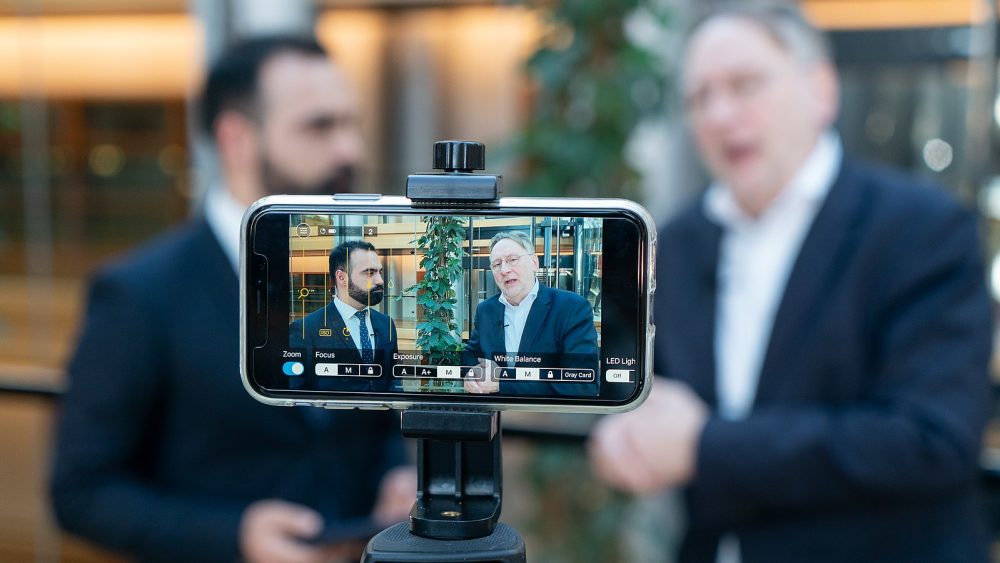
On 20–21 May, EMHIS holds its ninth conference called EMHIS Forum IX. The first of these two days has the specific theme of ‘Parliament & Media’ and this day is open to everyone interested in the evolving love-hate relationship between parliamentarians and media over the last two centuries. We hope you will be able to join us, listen to interesting presentations and take part in the discussion!
From the programme (please note that it is Central European Time):
9.20 Opening remarks by Betto van Waarden (Lund)
9.30 Panel 1: Parliaments’ own Media Communications
Betto van Waarden (Lund), joined by Mathias Johansson (Lund) during Q&A, Ian Harris (Leicester), Hilde Lavell (Radboud), joined by Carla Hoetink (Radboud) during Q&A, Sally Young (Melbourne). Moderator: Martin Sundby (Lund).
13.00 Panel 2: Parliamentary Reporting. Marcel Broersma (Groningen), Matti La Mela (Helsinki/Uppsala). Moderator: Michael Bossetta (Lund).
14.30 Panel 3: The Media as ‘Parliament’. Marco Althaus (Alfelder Zeitung), Solange Ploeg (Radboud), joined by Carla Hoetink (Radboud) during Q&A. Moderator: Harm Kaal (Radboud).
16.00 Keynote: The Congressional Press Galleries: Causes and consequences of self-regulation. Donald Ritchie (US Senate). Moderator: Betto van Waarden (Lund).
The conference organiser of this day is Dr. Betto van Waarden, as a part of his MSCA research fellowship at Lund University. Please send Betto a mail (see address on his webpage, link above) to retrieve the full programme and the Zoom link for the event.
Welcome!
Comments